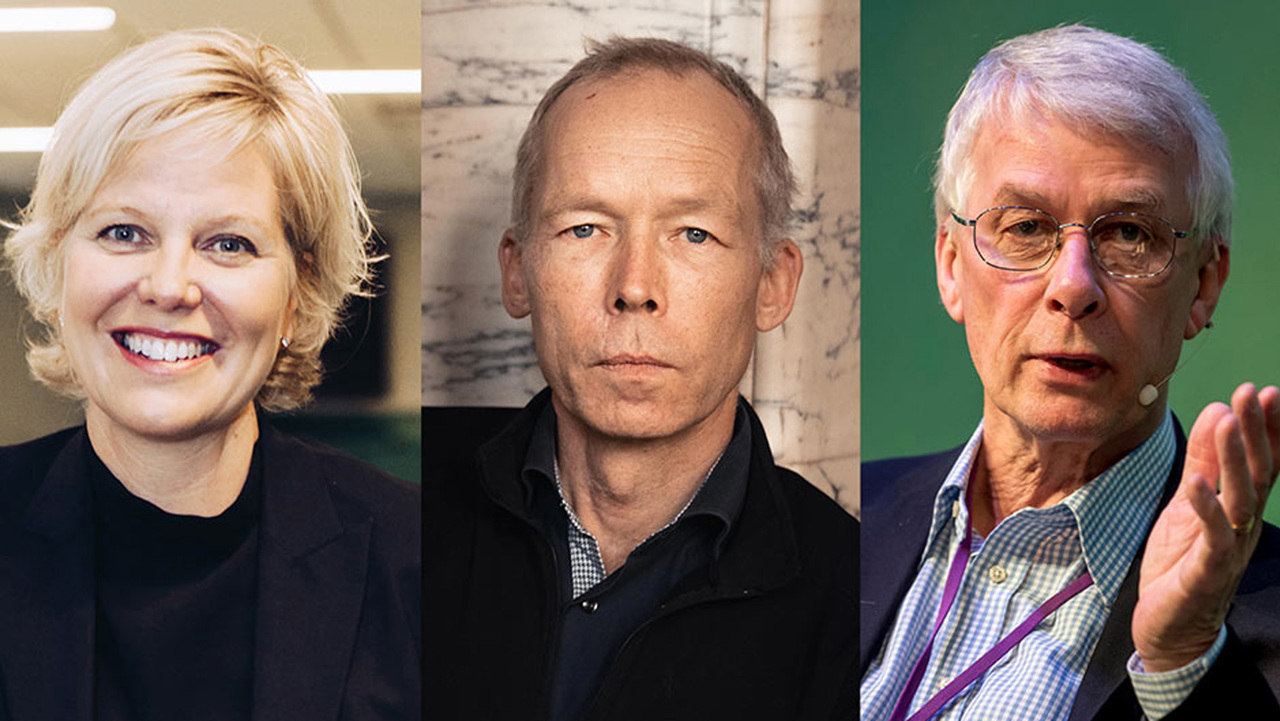Hur talar vi om vetenskap?

Om samtalet
Det är inte alltid enkelt för forskare att nå ut med sina resultat. Hur kan man hitta nya vägar för att förmedla viktiga budskap? Kan scenkonst och kultur vara ett sätt att träffa en nerv? Vilka andra vägar finns för att skapa nyfikenhet kring vad vetenskapen kan säga oss som människor?
Välkommet till ett filmat samtal om hur man kan förmedla vetenskap på olika sätt. Samtalet har tagits fram i ljuset av miljö- och klimatforskaren Johan Rockströms medverkan i Performance Lecture: Om vår stund på jorden på Dramaten. Medverkar i samtalet gör även Sir Richard J. Roberts, Nobelpristagare och expert på genmodifierade grödor och Anna Sjöström Douagi, programchef på Nobel Prize Museum. Här får publiken lyssna till konkreta exempel på hur man kan arbeta för att nå ut, skapa intresse och nyfikenhet kring forskningsresultat, bland annat kring klimatet – samt en dos önskningar om vad som behöver göras framöver.
Forskaren Johan Rockström arbetar outtröttligt med att få beslutsfattare och allmänheten att förstå klimatfrågan och visa på vetenskapliga fakta samt tydliga exempel på vad för beslut som behöver tas framöver. Hans medverkan i föreställningen Om vår stund på jorden är ett sätt att testa nya vägar att nå ut. Samarbetsprojektet Performance Lecture är skapat med syfte att knyta samman vetenskapliga resultat med teaterns verktyg för att göra innehållet engagerat och skapa en känsla av angelägenhet.
Nobelpristagare Richard J. Roberts fick Nobelpriset i fysiologi eller medicin 1993 för sin upptäckt om hur gener kan ge upphov till flera olika sorters proteiner. Roberts har arbetat aktivt med att förmedla vad genmodifierade växter är och hur de kan bidra med för att försörja mänskligheten med föda. Han är också mycket engagerad i mänskliga rättigheter och samlar pristagare i olika initiativ för att lyfta frågor och för att använda kraften hos Nobelpristagarna i att få folk att lyssna.
Anna Sjöström Douagi arbetar med att utveckla nya Nobelprisprogram och format och är bland annat initiativtagare till Performance Lecture-samarbetet mellan Dramaten och Nobel Prize Museum. Douagi bor för tillfället i Washington DC och arbetar också med ett större digitalt möte som kommer att äga i april 2021. Mötet ”Nobel Prize Summit: Our planet, Our future” kommer att samla Nobelpristagare, forskare, beslutsfattare och unga ledare för att belysa vad som behöver göras för att mänskligheten ska överleva på jorden.
What makes us listen to science?
What makes us listen to scientific results and what makes us change our behaviour or policies as a results of existing knowledge? The Performance Lecture ”About our time on Earth” by professor Johan Rockström, an expert whithin climate change research, is an attempt to intermingle the scientific results with the tools from the theatre in order to engage the audience into both looking for new knowledge and to get enganged in pressing issues. What kind of actions are needed in order for a general audience to get informed and for policy makers to decide to take actions based on scientific results? In this conversation professor Johan Rockström will discuss about his efforts as a scientist to reach out to policy makers and a general audience and bring up examples of what can be done together with Nobel Laureate Sir Richard Roberts, awarded the Nobel Prize in Medicine 1993 and a strong advocate for human rights, and Anna Sjöström Douagi, Science and Program Director at the Nobel Prize Museum and concept developer of the Performance Lecture collaboration between Dramaten and the Nobel Prize Museum.
Researcher Johan Rockström works tirelessly to make decision-makers and the general public understand the climate issue and show scientific facts as well as clear examples of what kind of decisions need to be made in the future. His participation in the performance "Performance Lecture: Our brief moment on earth” is a way to explore new ways to reach out with research. The project Performance Lecture is created with the aim of linking scientific results with the theater's tools to make the content engaging and create a sense of urgency.
Nobel Laureate Richard J. Roberts received the Nobel Prize in Physiology or Medicine in 1993 for his discovery of how genes can give rise to several different types of proteins. Roberts has worked actively to convey what genetically modified plants are and how they can contribute to providing humanity with food. He is also very committed to human rights and gathers Laureates in various initiatives to raise issues and to use the power of Nobel Laureates in getting people to listen.
Anna Sjöström Douagi is working on developing new Nobel Prize programs and formats and is, among other things, the initiator of the Performance Lecture collaboration between Dramaten and the Nobel Prize Museum. Anna Sjöström Douagi currently lives in Washington DC and is also working on a major digital meeting that will take place in April 2021. The meeting "Nobel Prize Summit: Our planet, Our future" will bring together Nobel Laureates and decision makers to highlight what needs to be done for humanity to survive on earth..